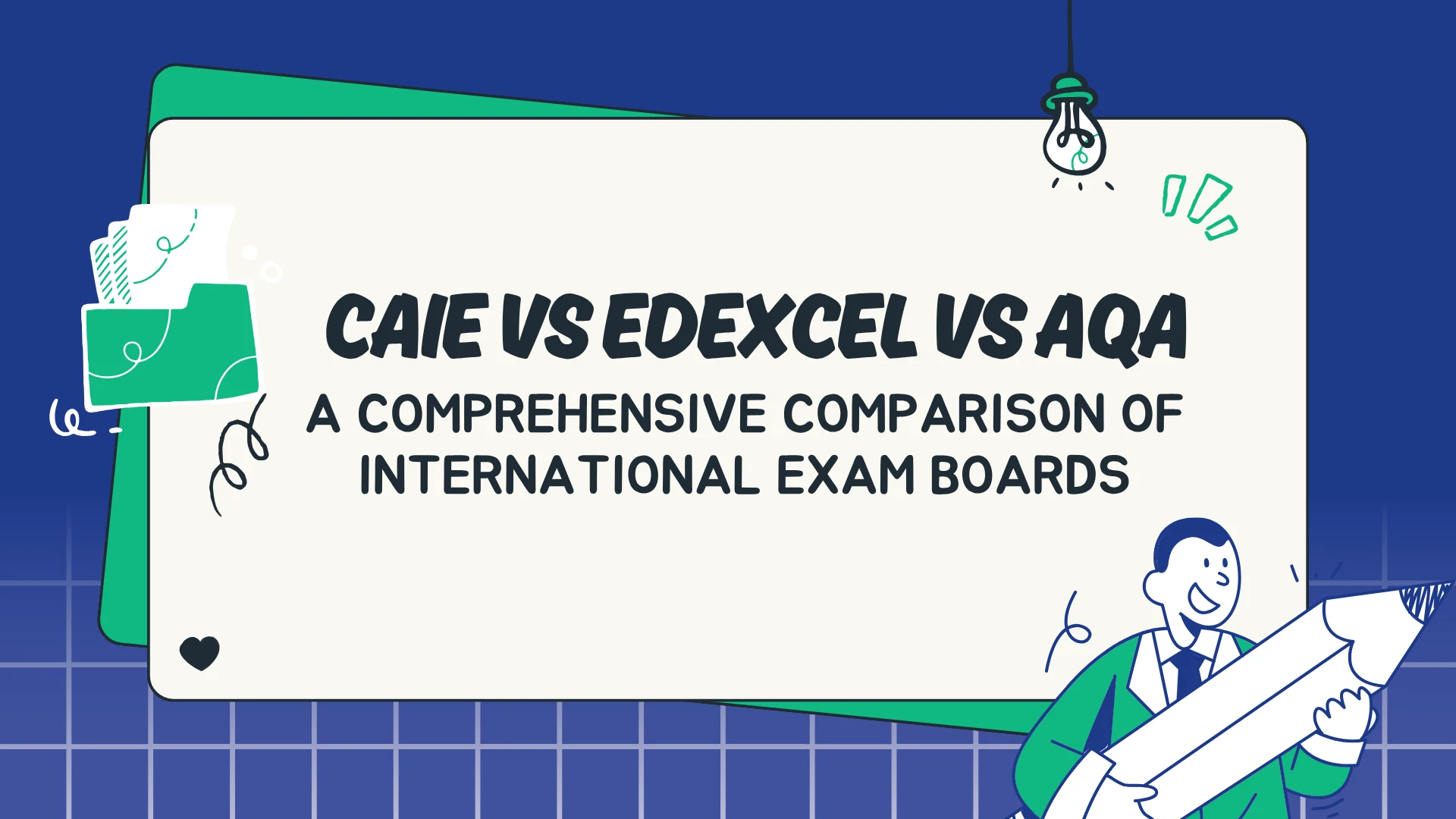Choosing the right examination board can significantly impact a student’s academic journey and prospects. Globally, three prominent boards, CAIE (Cambridge Assessment International Education), Edexcel (Pearson Edexcel), and AQA (Assessment and Qualifications Alliance), offer world-recognized qualifications such as O Levels, IGCSEs, and A Levels.
Each board offers globally recognized qualifications, but they differ in terms of syllabus structure, exam patterns, grading systems, and regional popularity.
Understanding the distinctions between these boards is essential for making an informed decision that aligns with a student’s academic goals, university aspirations, and learning style. In this comparison, we will explore the key features, pros and cons, and suitability of each board to help you decide which path is right for you.
This article compares these boards in terms of curriculum, grading, recognition, exam format, and suitability for different types of students.
Understanding the Top UK Exam Boards: CAIE vs Edexcel vs AQA

CAIE, Edexcel, and AQA are top UK exam boards offering international qualifications. Each has unique strengths in curriculum, flexibility, and global recognition. Choose based on your learning style.
| Feature | CAIE | Edexcel | AQA |
|---|---|---|---|
| Full Name | Cambridge Assessment International Education | Pearson Edexcel | Assessment and Qualifications Alliance |
| Based In | United Kingdom (University of Cambridge) | United Kingdom (Pearson Group) | United Kingdom |
| Qualifications | IGCSE, O Level, AS & A Level | International GCSE, A Level | GCSE, AS & A Level |
| Popular Regions | Asia, Middle East, Africa (160+ countries) | UK, South Asia, Middle East | Primarily UK, some international schools |
| Known For | Global reach, critical thinking, academic rigor | Flexibility, modular exams, digital support | Strong analysis, structured assessments |
| Curriculum Style | Broad and balanced, globally relevant | Modern, updated, skill-based | In-depth, analytical, especially in humanities |
CAIE (Cambridge Assessment International Education)
CAIE is a part of the University of Cambridge and is one of the most widely recognized international examination boards. It offers IGCSE, O Level, and A Level qualifications and is especially popular in countries across Asia, Africa, and the Middle East. Known for its rigorous academic standards and global recognition.
- Based in: United Kingdom (Cambridge University)
- Offers: IGCSEs, O Levels, AS & A Levels
- Popular in: Pakistan, UAE, India, Singapore, and over 160 countries
- Known for: A broad and balanced curriculum, global relevance
CAIE focuses on encouraging critical thinking, deep subject understanding, and practical application of knowledge.
2. Edexcel (Pearson Edexcel)
Edexcel is the UK’s largest awarding body and operates under Pearson, a global education company. It provides both UK and international qualifications, including International GCSEs and A Levels.
- Based in: United Kingdom (Pearson Group)
- Offers: International GCSEs, A Levels
- Popular in: UK, Middle East, South Asia
- Known for: Modular approach, more flexible assessments
Edexcel is known for its modern approach to education, offering updated syllabi, digital resources, and a modular exam structure. It is widely used in both UK schools and international institutions.
3. AQA (Assessment and Qualifications Alliance)
AQA is one of the leading exam boards in the UK, offering GCSE and A Level qualifications. While AQA is not as commonly offered outside the UK, it is highly regarded for its structured assessments and strong academic reputation.
- Based in: United Kingdom
- Offers: GCSEs, AS & A Levels
- Popular in: United Kingdom (mainly), some international schools
- Known for: Rigor and analytical depth
AQA emphasizes analytical and evaluative skills, particularly in subjects like English, History, and the Sciences.
Curriculum and Subject Choices
One of the most important factors to consider when choosing an exam board is the curriculum structure and the variety of subject choices offered. While all three boards, CAIE, Edexcel, and AQA, cover core academic subjects, each has its own approach to syllabus design, assessment style, and subject availability.
Some boards provide more flexibility in course selection, while others emphasize depth and academic rigor. In this section, we will explore how the subject offerings and curriculum frameworks differ among CAIE, Edexcel, and AQA, helping students choose the board that best matches their interests, strengths, and academic goals.
- CAIE (Cambridge Assessment International Education)
CAIE offers a wide range of subjects at IGCSE, O Level, AS, and A Level stages. Its curriculum is globally oriented and designed to suit international students, making it a popular choice in countries like Pakistan, the UAE, and India.
Cambridge encourages schools to customize subject combinations to meet local needs. Subjects are generally conceptual and in-depth, focusing on critical thinking and application.
- O Level/IGCSE: Subjects include Mathematics, English, Physics, Chemistry, Biology, Computer Science, Business Studies, Sociology, Economics, and more.
- A Levels: Offers over 55 subjects, with students typically choosing 3–4 subjects.
Highlight: Flexibility in subject combinations and a strong international reputation.
- Edexcel (Pearson Edexcel)
Edexcel provides both UK and International GCSEs and A Levels, which are tailored for students outside the UK. Its curriculum often features more updated content, digital resources, and modular exam formats, especially at the A Level stage.
- International GCSEs: Include core and elective subjects such as Maths, Sciences, English, ICT, Accounting, Economics, and Global Citizenship.
- A Levels: Available in both modular and linear formats, with a choice of over 40+ subjects.
Highlight: Modern syllabus structure with clear objectives and slightly less theoretical content than CAIE, making it student-friendly.
- AQA (Assessment and Qualifications Alliance)
AQA is primarily focused on the UK education system and is known for its well-structured and analytical curriculum. While it offers a wide range of subjects, it is less commonly available in international schools compared to CAIE and Edexcel.
- GCSEs: Covers a broad range of subjects including Literature, Sciences, Maths, Psychology, and Design & Technology.
- A Levels: Known for strong humanities and science subjects like English Literature, History, Psychology, Physics, and Biology.
Highlight: Strong emphasis on analytical skills, essay writing, and subject evaluation, especially in humanities and social sciences.
Grading System
The grading system plays a crucial role in how a student’s performance is evaluated and presented to universities and employers. While CAIE, Edexcel, and AQA all maintain high academic standards, their grading scales, assessment methods, and result reporting differ slightly. Understanding these distinctions can help students and parents make informed choices based on ease of scoring, transparency, and global recognition.
- CAIE
CAIE uses traditional alphabetical grading for O Levels and A Levels, with grades ranging from A to E* at A Level and A to G* at O Level.
- O Level/IGCSE: A* (highest) to G (lowest), with U representing ungraded.
- A Levels: A* to E are passing grades; A is awarded only at A2 level*, not at AS level.
Key Point: Grading is based on raw scores converted to thresholds, which can vary yearly depending on exam difficulty.
- Edexcel
Edexcel uses both numerical (9–1) and alphabetical (A–E)* grading systems depending on the qualification type and whether it’s UK or International.
- International GCSEs: Graded from 9 (highest) to 1 (lowest), aligning with the UK system.
- A Levels: Graded from A to E*, similar to CAIE. The A* grade is available at A2 level.
Key Point: Edexcel’s numerical grading provides greater differentiation among top students in GCSEs. Results are often modular, allowing for resits of individual units.
- AQA
AQA follows the UK national grading system, using:
- GCSEs: 9–1 grading scale, where 9 is the highest and 1 is the lowest. Grade 4 is considered a standard pass.
- A Levels: Traditional A to E* grading.
Key Point: AQA is known for its rigorous marking schemes, especially in essay-based subjects. Grades are often tightly aligned with assessment objectives.
Recognition and University Acceptance
When selecting an examination board, one of the most important considerations is how well its qualifications are recognized by universities and employers around the world. CAIE, Edexcel, and AQA are all reputable boards, but their global reach, regional preference, and university admission compatibility vary slightly.
- CAIE
CAIE qualifications enjoy widespread international recognition, including acceptance by universities in the UK, USA, Canada, Australia, Europe, and Asia.
- A Level and IGCSE qualifications are considered equivalent to the UK’s national curriculum, making them ideal for both local and international university admissions.
- Many universities are familiar with CAIE’s rigorous curriculum and value its depth and critical thinking focus.
Key Strength: Strong reputation in Asia, the Middle East, and Africa; trusted by top-tier universities worldwide.
- Edexcel
Edexcel qualifications are also highly recognized by global universities, especially because Pearson is a major UK awarding body.
- International GCSEs and A Levels from Edexcel are accepted by universities in the UK and abroad, including the Ivy League (USA), Russell Group (UK), and top institutions worldwide.
- Edexcel’s modular system may appeal to students who prefer a more flexible approach to assessments.
Key Strength: Well accepted in the UK and recognized globally; ideal for students targeting diverse international universities.
- AQA
AQA is primarily known in the UK education system, but its qualifications are recognized by most English-speaking universities.
- AQA GCSEs and A Levels are accepted for university entry in the UK, USA, Canada, Australia, and several European countries.
- However, AQA is less commonly offered outside the UK and may require additional explanation or equivalency certificates in certain countries.
Key Strength: Highly regarded in the UK, especially for essay-based and analytical subjects; a good choice for students aiming for British universities.
Examination Style and Difficulty
The examination style and difficulty level can significantly impact a student’s learning experience and final performance. While all three boards, CAIE, Edexcel, and AQA, maintain high academic standards, they differ in how they assess knowledge, the structure of exams, and the level of challenge in various subjects. Understanding these differences can help students choose a board that aligns with their strengths and exam-taking preferences.
- CAIE
CAIE exams are known for their conceptual depth and analytical focus. The questions often test understanding, application, and problem-solving rather than rote memorization.
- Exams are mostly linear: Students take all assessments at the end of the course.
- Papers include a mix of multiple-choice, structured questions, and extended responses.
- Subjects like Physics, Math, and Economics are considered challenging and theory-heavy.
Difficulty Level: High Emphasis on deep understanding, suitable for academically strong students.
- Edexcel
Edexcel offers both modular and linear exam structures, especially in A Levels, allowing students to take exams in parts (modules) and retake specific units if needed.
- Questions tend to be clear and straightforward, focusing on practical application and syllabus-based learning.
- Often viewed as more student-friendly, especially in sciences and business-related subjects.
- International versions are tailored for global learners, with simplified language in some cases.
Difficulty Level: Moderate: Balanced and structured for consistent performers who prefer regular assessments.
- AQA
AQA exams are well-known for their analytical, essay-based assessments, particularly in subjects like English, Psychology, and History.
- Strong emphasis on evaluation, critical thinking, and structured writing.
- Papers are strictly marked, especially in subjective subjects.
- Mostly linear, with summative assessments at the end of the course.
Difficulty Level: High in written/essay subjects: Best suited for students who excel in written communication and critical analysis.
6. Subject Availability
- CAIE: Offers over 70 subjects in IGCSE and 55+ in A Levels.
- Edexcel: Offers a wide range but fewer than CAIE in some regions.
- AQA: Limited subject offering internationally; focused on the UK curriculum.
7. Ideal for Which Students?
Choosing the right examination board depends largely on a student’s academic strengths, learning style, career goals, and future university plans. While all three boards, CAIE, Edexcel, and AQA, are reputable and globally recognized, each is better suited to specific types of students based on how the curriculum is designed, how exams are structured, and how performance is assessed.
- CAIE
Best for:
- Students who are academically strong and can handle challenging, concept-based questions.
- Those aiming for top-tier international universities.
- Learners who prefer a traditional and structured curriculum with emphasis on theory and analytical skills.
- Students in regions where CAIE is widely accepted, such as South Asia, the Middle East, and Africa.
Ideal For: High achievers, independent learners, and those planning to study abroad.
- Edexcel
Best for:
- Students who prefer a balanced and flexible exam structure, such as modular A Levels.
- Learners who thrive with clearer marking schemes and practical applications.
- International students are looking for globally recognized qualifications with modern, accessible content.
- Those who benefit from retake options and prefer to spread assessments across multiple sessions.
Ideal For: Consistent performers, international students, and those needing a flexible path.
- AQA
Best for:
- Students aiming to apply to UK universities, especially in the humanities, social sciences, and English-based programs.
- Learners with strong analytical thinking, essay writing, and critical evaluation skills.
- Those comfortable with linear exam formats and strict marking standards.
- UK-based students or those in schools offering the UK National Curriculum.
Ideal For: Strong writers, critical thinkers, and UK university applicants.
Conclusion
In the competitive world of international education, CAIE, Edexcel, and AQA each provide high-quality, globally recognized qualifications that serve as stepping stones to top universities and successful careers. However, they differ in several key areas, including curriculum structure, grading systems, exam style, and difficulty levels, making each suitable for different types of students.
CAIE stands out for its global presence, academic depth, and strong focus on conceptual learning. It is particularly favored in South Asia, the Middle East, and Africa, and is ideal for students who excel in theoretical and analytical subjects. Its rigorous curriculum prepares students for a smooth transition into competitive university environments around the world.
Edexcel, backed by Pearson, offers a modern and flexible educational approach. With options for modular assessments and a practical curriculum design, it appeals to students who prefer a clear structure and consistent evaluation. Edexcel is a smart choice for international learners aiming for well-rounded academic development with opportunities to retake units and improve scores.
AQA, although less common outside the UK, has a strong foothold in the British education system. It emphasizes analytical thinking, essay writing, and evaluation, particularly in subjects like English, History, and Psychology. For students targeting UK universities, especially in the humanities or social sciences, AQA offers a valuable academic experience that aligns well with UK university expectations.
Ultimately, no board is inherently better than the other; the right choice depends on the student’s learning preferences, academic strengths, career goals, and university destinations. Schools, parents, and students should carefully consider these factors when selecting the board that will best support long-term success.
Frequently Asked Questions (FAQs)
What is the main difference between CAIE, Edexcel, and AQA?
The main differences lie in their curriculum design, exam structure, grading system, and regional popularity. CAIE focuses on conceptual depth, Edexcel offers modular flexibility, and AQA emphasizes analytical skills with a UK-centric approach.
Which board is easier to score well in?
Edexcel is often considered more student-friendly due to its modular exams and clearer marking schemes, but ease varies by subject and student strengths.
Are CAIE, Edexcel, and AQA recognized by universities worldwide?
Yes, all three boards are internationally recognized and accepted by most universities, but CAIE and Edexcel have broader global recognition.
Can students outside the UK take Edexcel and AQA exams?
Yes, Edexcel International is widely available globally, while AQA International is less common but offered in some regions.
Which board offers more subject options?
CAIE generally offers the widest variety of subjects, followed by Edexcel, then AQA.
How do the grading systems differ among these boards?
CAIE and Edexcel A Levels use the A* to E grading scale. Edexcel International GCSEs and AQA GCSEs use the 9 to 1 numerical scale. CAIE O Levels use A* to G.
Which board is best for students aiming for UK universities?
AQA and CAIE are both highly accepted, but AQA is especially aligned with UK standards and university expectations.
Are modular exams available in all three boards?
Modular exams are available primarily with Edexcel; CAIE and AQA mostly use linear exam formats.
Can students switch boards during their studies?
Switching is possible but may require catching up on syllabus differences and depends on school policies.
Which board focuses more on essay writing and analytical skills?
AQA is known for its strong emphasis on essay-based and analytical assessments, especially in humanities subjects.









Leave a comment